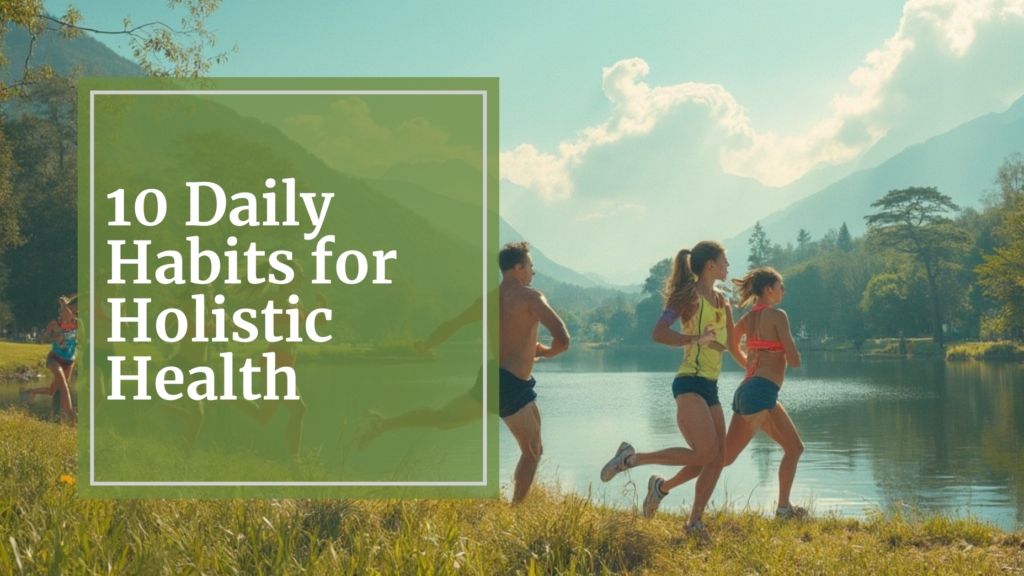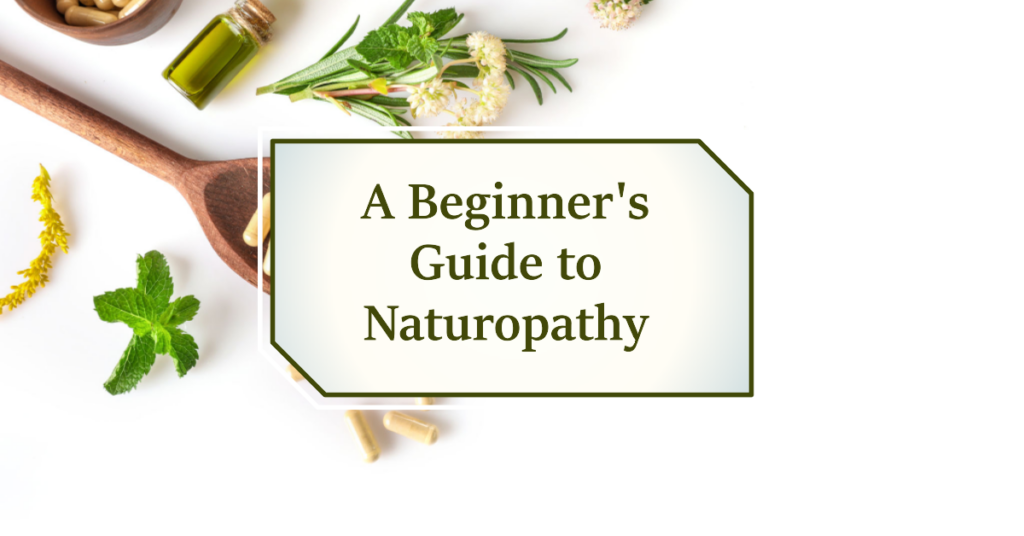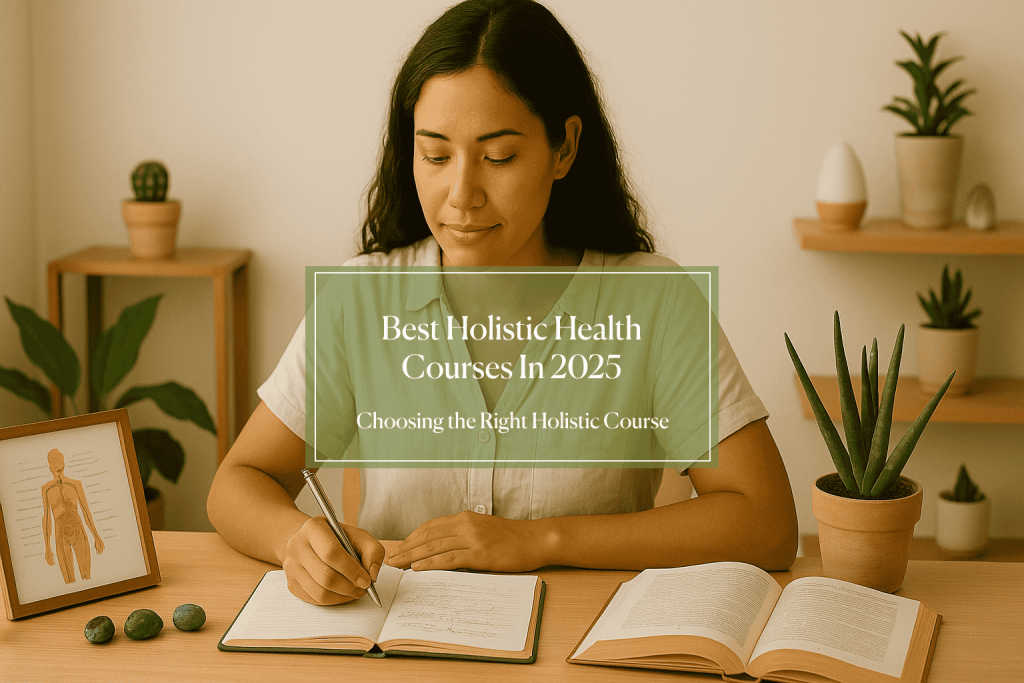10 Daily Habits for Holistic Well-Being

Table of Contents
- Introduction
- Mindful Meditation
- Nourishing Nutrition
- Regular Exercise
- Quality Sleep
- Hydration
- Gratitude Practice
- Digital Detox
- Nature Connection
- Continuous Learning
- Social Connections
- Conclusion
Introduction
In today’s fast-paced world, achieving holistic well-being has become more crucial than ever. Holistic health encompasses not just physical fitness, but also mental, emotional, and spiritual wellness. By adopting a set of daily habits, we can nurture all aspects of our being and lead more balanced, fulfilling lives. This comprehensive guide will explore 10 essential daily habits for holistic well-being, providing you with practical strategies to enhance your overall health and vitality.
As we delve into these habits, it’s important to remember that holistic health is a journey, not a destination. Each small step you take towards incorporating these practices into your daily routine can lead to significant improvements in your overall well-being. Whether you’re new to the concept of holistic health or looking to deepen your existing practices, this guide will offer valuable insights and actionable tips.
For those seeking to expand their knowledge and potentially pursue a career in this field, consider exploring the Holistic Health Practitioner course. This comprehensive program can provide you with in-depth knowledge and skills to not only enhance your personal well-being but also guide others on their journey to holistic health.
Now, let’s dive into the 10 daily habits that can transform your approach to holistic well-being.
1. Mindful Meditation

Time Required: 10-20 minutes
Materials Needed: Comfortable seating (cushion, chair, or mat), timer (optional)
Mindful meditation is a powerful practice that forms the cornerstone of holistic well-being. It involves focusing your attention on the present moment, acknowledging and accepting your thoughts and feelings without judgment. Regular meditation can reduce stress, improve emotional regulation, and enhance overall mental clarity.
To incorporate mindful meditation into your daily routine:
- Find a quiet, comfortable space where you won’t be disturbed.
- Sit in a comfortable position, either on a cushion, chair, or mat.
- Close your eyes and focus on your breath, noticing the sensation of air moving in and out of your body.
- When your mind wanders (which is natural), gently bring your attention back to your breath.
- Start with 5-10 minutes daily and gradually increase the duration as you become more comfortable with the practice.
For those new to meditation, guided sessions can be incredibly helpful. Apps like Headspace offer a variety of guided meditations suitable for beginners and experienced practitioners alike.
Benefits:
- Reduced stress and anxiety
- Improved focus and concentration
- Enhanced emotional regulation
- Better sleep quality
- Increased self-awareness
Research published in the Journal of Clinical Psychology suggests that regular mindfulness meditation can significantly reduce symptoms of anxiety and depression, contributing to overall mental well-being.
2. Nourishing Nutrition

Nourishing your body with wholesome, nutrient-dense foods is essential for holistic well-being. A balanced diet provides the necessary fuel for physical health, mental clarity, and emotional stability. The key is to focus on whole, unprocessed foods that offer a wide range of vitamins, minerals, and antioxidants.
Here are some tips for incorporating nourishing nutrition into your daily routine:
- Start your day with a nutrient-packed breakfast, such as a smoothie bowl with fruits, vegetables, and seeds.
- Include a variety of colorful fruits and vegetables in your meals to ensure a broad spectrum of nutrients.
- Choose whole grains over refined carbohydrates for sustained energy and better digestion.
- Incorporate lean proteins like fish, poultry, legumes, or plant-based alternatives to support muscle health and satiety.
- Stay hydrated by drinking plenty of water throughout the day.
For more detailed information on the benefits of a plant-based diet, which can be an excellent foundation for nourishing nutrition, check out this comprehensive guide from the MD Anderson Cancer Center: 5 Benefits of a Plant-Based Diet.
If you’re interested in deepening your understanding of holistic nutrition, consider exploring the holistic nutrition consultant training course. This comprehensive program can provide you with the knowledge and skills to make informed dietary choices and potentially guide others in their nutritional journey.
| Food Group | Examples | Benefits |
|---|---|---|
| Fruits | Berries, citrus fruits, apples | Rich in antioxidants, vitamins, and fiber |
| Vegetables | Leafy greens, cruciferous vegetables, root vegetables | Packed with vitamins, minerals, and phytonutrients |
| Whole Grains | Quinoa, brown rice, oats | Provide sustained energy and essential B vitamins |
| Lean Proteins | Fish, poultry, legumes, tofu | Support muscle health and provide essential amino acids |
| Healthy Fats | Avocado, nuts, seeds, olive oil | Promote brain health and support hormone production |
3. Regular Exercise

Time Required: 30-60 minutes
Materials Needed: Comfortable workout clothes, appropriate footwear, exercise equipment (optional)
Regular physical activity is a cornerstone of holistic well-being, benefiting not just the body, but also the mind and spirit. Exercise helps maintain a healthy weight, strengthens muscles and bones, improves cardiovascular health, and boosts mood and cognitive function.
To incorporate regular exercise into your daily routine:
- Choose activities you enjoy to increase the likelihood of sticking to your routine.
- Aim for at least 30 minutes of moderate-intensity exercise most days of the week.
- Mix up your routine with a combination of cardio, strength training, and flexibility exercises.
- Start slowly and gradually increase intensity and duration to avoid injury.
- Consider joining group classes or finding an exercise buddy for motivation and accountability.
For those interested in a more mindful approach to movement, explore the concept of mindful exercise. The University of Utah Health provides an excellent resource on mindful movement as a path to holistic well-being.
Benefits:
- Improved cardiovascular health
- Increased strength and flexibility
- Enhanced mood and reduced symptoms of anxiety and depression
- Better sleep quality
- Improved cognitive function and memory
Research published in the Journal of Health Psychology suggests that regular exercise can significantly reduce stress levels and improve overall quality of life.
4. Quality Sleep

Quality sleep is essential for holistic well-being, playing a crucial role in physical recovery, mental clarity, and emotional balance. Establishing good sleep hygiene habits can significantly improve the quality and quantity of your sleep.
Here are some tips for improving your sleep quality:
- Stick to a consistent sleep schedule, even on weekends.
- Create a relaxing bedtime routine to signal to your body that it’s time to wind down.
- Ensure your sleeping environment is dark, quiet, and cool.
- Limit exposure to blue light from electronic devices at least an hour before bed.
- Avoid caffeine, alcohol, and heavy meals close to bedtime.
For a comprehensive guide on sleep hygiene and its role in holistic wellness, check out this informative article on the essential role of sleep hygiene in achieving holistic wellness.
If you’re interested in learning more about the impact of sleep on overall health, the introduction to holistic nutrition course offers valuable insights into how nutrition and lifestyle factors, including sleep, contribute to holistic well-being.
5. Hydration

Proper hydration is often overlooked but is crucial for holistic well-being. Water plays a vital role in nearly every bodily function, from regulating body temperature to supporting digestion and cognitive function.
To ensure you stay well-hydrated throughout the day:
- Start your day with a glass of water to rehydrate after sleep.
- Carry a reusable water bottle with you and sip regularly.
- Set reminders on your phone or use apps to track your water intake.
- Eat water-rich foods like fruits and vegetables to supplement your fluid intake.
- Limit caffeine and alcohol consumption, as these can contribute to dehydration.
Remember, the amount of water you need can vary based on factors like climate, activity level, and overall health. A general guideline is to aim for 8 glasses (64 ounces) of water per day, but listen to your body’s thirst signals and adjust accordingly.
6. Gratitude Practice

Time Required: 5-10 minutes
Materials Needed: Journal, pen
Cultivating gratitude is a powerful practice that can significantly enhance your emotional well-being and overall life satisfaction. By regularly acknowledging the good things in your life, you can shift your focus from what you lack to what you have, fostering a more positive outlook.
To incorporate a gratitude practice into your daily routine:
- Set aside a few minutes each day, preferably in the morning or before bed.
- Write down three things you’re grateful for in a journal.
- Be specific and try to focus on different aspects of your life each day.
- Reflect on why you’re grateful for these things and how they impact your life.
- Periodically review your gratitude entries to reinforce positive feelings.
Benefits:
- Increased happiness and life satisfaction
- Reduced stress and anxiety
- Improved relationships and social connections
- Enhanced resilience in facing challenges
- Greater overall emotional well-being
Research published in the Journal of Personality and Social Psychology suggests that practicing gratitude can lead to greater happiness, better health, and stronger relationships.
7. Digital Detox

In our increasingly connected world, taking regular breaks from digital devices is essential for holistic well-being. A digital detox can help reduce stress, improve sleep quality, and enhance real-world connections.
Here are some strategies to incorporate a digital detox into your daily routine:
- Set specific times each day to be device-free, such as during meals or an hour before bedtime.
- Create tech-free zones in your home, like the bedroom or dining area.
- Practice the “20-20-20” rule: Every 20 minutes, look at something 20 feet away for 20 seconds to reduce eye strain.
- Engage in outdoor activities or hobbies that don’t involve screens.
- Use apps or built-in phone features to monitor and limit your screen time.
For more insights on maintaining a healthy relationship with technology, consider exploring the 5 tips for a healthy lifestyle, which includes strategies for balancing digital consumption with other aspects of well-being.
8. Nature Connection

Time Required: 15-60 minutes
Materials Needed: Comfortable outdoor clothing, water bottle
Connecting with nature is a powerful way to enhance holistic well-being. Spending time outdoors can reduce stress, improve mood, boost vitamin D levels, and provide a sense of peace and perspective.
To incorporate nature connection into your daily routine:
- Take a daily walk in a local park or green space.
- Practice mindfulness or meditation outdoors.
- Engage in outdoor activities like gardening or hiking.
- Bring elements of nature indoors with houseplants or a small herb garden.
- Observe and appreciate natural phenomena like sunrises, sunsets, or starry nights.
Benefits:
- Reduced stress and anxiety
- Improved mood and cognitive function
- Enhanced physical health through increased activity and vitamin D exposure
- Greater sense of connection to the world around you
- Improved sleep quality
Research published in the International Journal of Environmental Research and Public Health suggests that spending time in nature can significantly reduce cortisol levels, a key stress hormone, contributing to overall well-being.
9. Continuous Learning

Engaging in continuous learning is essential for holistic well-being, as it stimulates cognitive function, boosts self-esteem, and provides a sense of purpose and accomplishment. Learning new skills or acquiring knowledge can also open up new opportunities and enhance your personal and professional life.
Here are some ways to incorporate continuous learning into your daily routine:
- Read books or articles on topics that interest you.
- Take online courses or attend workshops to develop new skills.
- Listen to educational podcasts during your commute or while doing chores.
- Practice a new language using apps or language exchange programs.
- Engage in discussions or debates on thought-provoking topics with friends or online communities.
For those interested in expanding their knowledge in holistic health, the how to make the most of holistic online course article provides valuable tips on maximizing your learning experience in online holistic health programs.
10. Social Connections

Nurturing social connections is crucial for holistic well-being. Strong relationships and a sense of community can provide emotional support, reduce stress, and contribute to overall life satisfaction.
To strengthen your social connections:
- Make time for regular check-ins with friends and family, either in person or virtually.
- Join clubs or groups related to your interests to meet like-minded people.
- Volunteer for local organizations to connect with your community.
- Practice active listening and empathy in your interactions.
- Organize or participate in social activities that align with your values and interests.
Remember, quality is often more important than quantity when it comes to social connections. Focus on nurturing meaningful relationships that provide mutual support and understanding.
Conclusion
Incorporating these 10 daily habits into your routine can significantly enhance your holistic well-being, nurturing your mind, body, and spirit. Remember that adopting new habits takes time and patience. Start small, be consistent, and gradually build these practices into your daily life.
As you embark on this journey towards holistic well-being, consider deepening your knowledge with resources like the 50 holistic nutrition recipes book, which can provide practical guidance for nourishing your body holistically.
For those interested in exploring holistic health further, whether for personal growth or professional development, the official certificate for holistic nutrition consultant training course offers comprehensive education in this field.
Remember, holistic well-being is a lifelong journey. Be kind to yourself, celebrate small victories, and enjoy the process of becoming the healthiest, happiest version of yourself.
Explore More
- What Can You Do with Holistic Nutrition Certification?
- 8 Best Superfoods for Your Immune System
- Top 10 Natural Supplements for Better Health








Responses